Our view at Stack - ClickFunnels was founded by an online marketing legend Russell Brunson and it offers several benefits for online businesses and marketers:
- Time and Cost Savings: Efficiently create sales funnels without extensive development efforts.
- Maximized Conversions: Test offers, copy, and images to enhance conversions.
- Specific Landing Pages: Generate highly targeted landing pages.
- Predictable Pipeline: Create consistent, predictable sales paths.
- Increased Sales: On average, it boosts sales of lesser products by 15%
The post Essential Tips For A Successful First Business Event appeared first on ClickFunnels.
Throwing business events can be a great way to strengthen your brand.
However, they are notoriously difficult to organize, as anyone who has ever done it will surely attest.
That’s why today we want to go over the most important things that you need to know about planning your first business event…
- Are You in This for the Long Haul?
- Start Small if This is Your First Business Event
- Decide on the Concept for Your Business Event
- Pick a Date and Time for Your Business Event
- Choose a Venue for Your Business Event
- Figure Out the Catering for Your Business Event
- Create a Schedule for Your Business Event
- Sort Out the Technology for Your Business Event
- Find Speakers for Your Business Event
- Hire an MC for Your Business Event
- Create a Checklist for Your Business Event
- Rehearse Your Business Event
- Promote Your Business Event
- Warning: You Need to Account for the Planning Fallacy!
- Something is Going to Go Wrong So Just Accept it!
Are You in This for the Long Haul?
Before we get into the nitty-gritty of event planning, we want to ask you if you see yourself organizing business events every year for the next decade. Why?
Because doing it just once probably isn’t worth it. It’s a recipe for experiencing the downside of throwing an event without benefiting from the upside.
Think about it: you’ll probably end up spending more time, energy, and money to put the event together than you have initially expected.
On top of that, you’ll have to deal with the stress of things going wrong, which they inevitably will at the most inopportune moments.
Finally, on the day of the event, you’ll have to keep everything on track, which is going to be exhausting.
However, realistically speaking, your first business event probably won’t be that great since you have never organized one before.
So you’d be going through all that hassle to throw an event that would most likely be mediocre at best. That’s not going to help you strengthen your brand if that’s what you are hoping for.
The brand-building benefits come from hosting the same event every year, making it better each time, and patiently growing your audience.
Nathan Barry, the founder of ConvertKit, wrote about this back in 2019 before the company’s third Craft + Commerce annual conference:
“The first year it was hard to convince people to try out a new event, in a new city, from a new company. The second year ticket sales were easier and we had momentum, but only about 20% more revenue from ticket sales.
But now in the third year selling tickets is noticeably easier. Because of the reputation built in previous years we sold 175 tickets before we even announced a single speaker. Then the next 75 tickets sold quickly with our next promotion.
If we had given up after fighting the massive up hill battle of creating the conference, or given up when year two wasn’t that much more successful, then we wouldn’t have endured until season 3 when the momentum kicked in.”
At the time of writing, ConvertKit is preparing for their 2024 annual Craft + Commerce conference, so they are still at it five years later!
It’s possible to go from zero to hosting one of the most prominent annual events in your industry but only if you have a long-term mindset from the start because it’s going to take time.
So ask yourself: are you in this for the long haul?
Start Small if This is Your First Business Event

Don’t attempt to compete with the largest conferences in your industry because you are not going to win.
Instead, come up with the minimum viable product version of your business event that would enable you to create a positive experience for the attendees, deliver real value and leave a great first impression.
It might be best to start by planning a simple event that only lasts one evening. That will not only make it much easier for you to organize it but also to sell the idea to potential attendees.
People may be hesitant to go to an all-day or a multiple-day event that they have never heard of before, but they might be willing to attend it if it’s just one evening, assuming that they find the concept interesting.
You also want to keep it local because no one is going to travel to an unknown event that only lasts a few hours. This has several important implications that we are going to address later in this article.
Decide on the Concept for Your Business Event
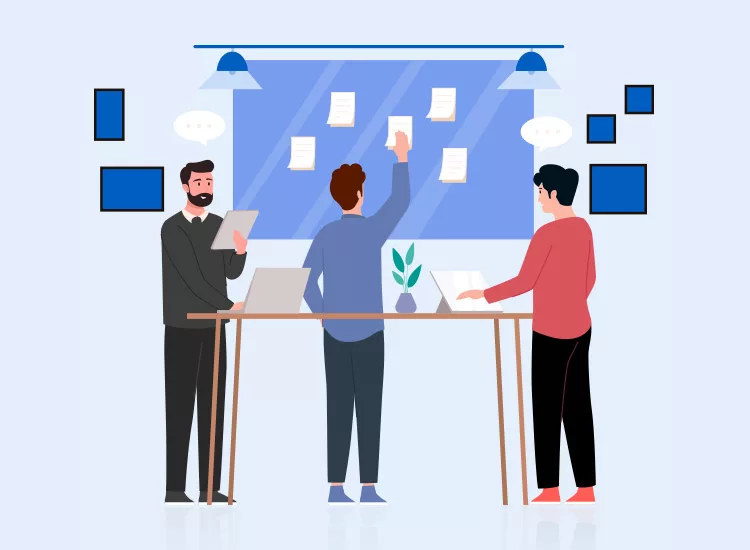
Your business event needs to have a clear concept. What exactly is the value proposition?
Zero in on your most important customer segment and then design an event concept that would appeal to that demographic.
Identify a subject that your dream attendees want to learn more about and then create an event that would enable them to do that.
For example, let’s say that your company is an email marketing agency that serves small businesses.
In that case, you want to attract small business owners to your event. The more specific your value proposition, the easier it will be for you to do that.
So instead of focusing on “email marketing” in general, which is way too vague, you could create an event about growing a business email list from zero to 1,000 email subscribers and then give your attendees a step-by-step process for doing that.
We also recommend making the event free if at all possible so that there would be no financial risk associated with attending it. It’s going to be difficult enough to persuade people to come. Don’t make it even more challenging by asking them to give you their hard-earned money!
Pick a Date and Time for Your Business Event
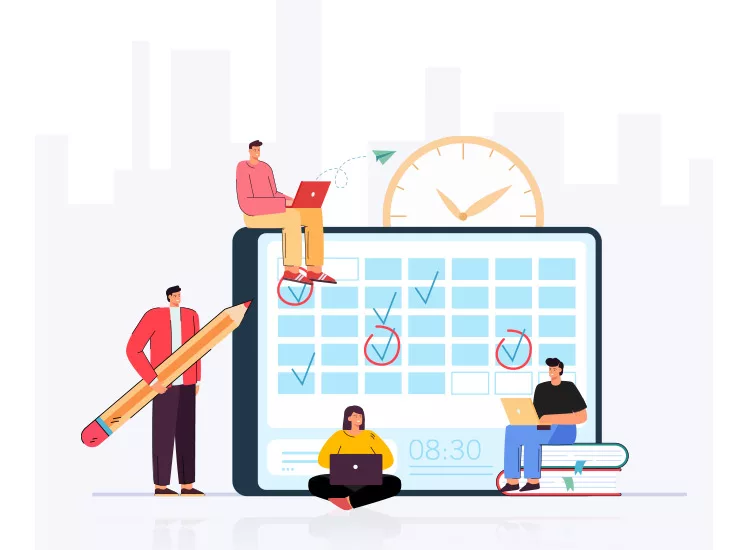
When you are considering various dates and times for your business event, make sure to check what else will be happening in your area.
Ideally, you want to pick a date and time when there won’t be much else going on, at least in terms of industry events that might be in direct competition with yours.
Also, make sure to consider factors such as work schedules, commutes, rush hour, etc., if you decide to host your event on a workday evening.
Choose a Venue for Your Business Event

The best venues for small business events are:
- Private rooms in cafes and restaurants
- Conference rooms in coworking spaces
- Conference rooms in schools and universities
You probably don’t need a big auditorium since it’s unlikely that too many people will show up.
Also, smaller spaces can help you create a more casual and friendly atmosphere. You are not hosting a large conference so you might as well lean into the meetup vibe!
Figure Out the Catering for Your Business Event
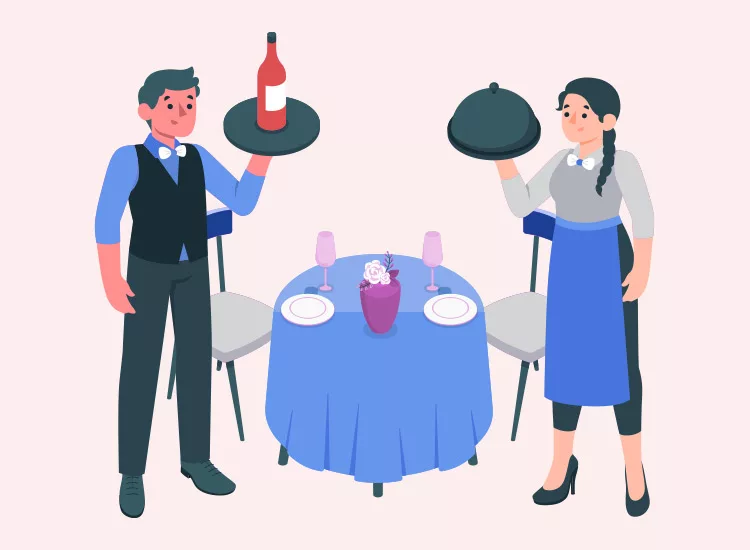
Catering isn’t that big of a deal for events that only last one evening but it would be nice to have a few coffee stations with some snacks.
That can help facilitate interactions between the attendees: people will be more likely to chat with each other during breaks if they are gathered around coffee stations with drinks and pastries in their hands.
Look up local catering agencies and call them to inquire how much that would cost. If all you need is hot beverages, snacks and a few waiters to mind the coffee stations, it shouldn’t be too expensive, especially if the event itself is only going to last a few hours.
And if you rent a private room at a restaurant as a venue for your event, then that restaurant can handle the catering, which will make coordinating everything much easier.
Create a Schedule for Your Business Event
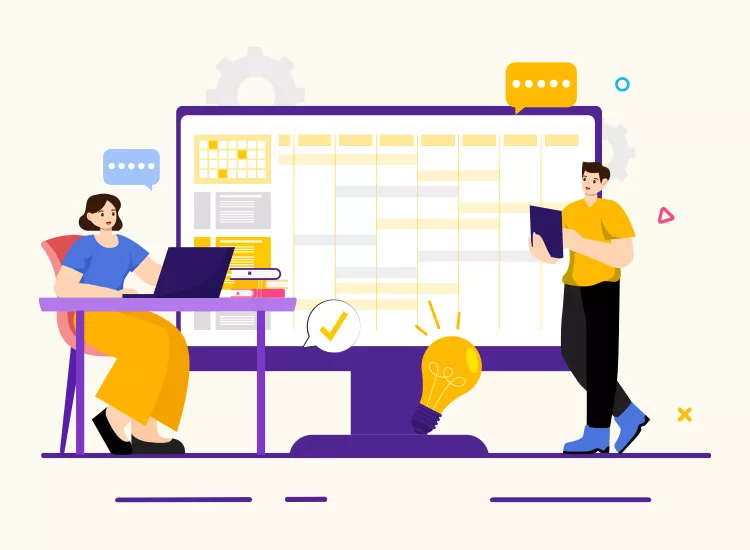
Schedule for an Event With One Speaker
You can make the event super short by being the only speaker and giving a lecture on your area of expertise.
You can structure it like this:
- 45 minutes of content
- 15-minute Q&A session
That way, the whole event will last just one hour, so you won’t need catering.
Schedule for an Event With Three Speakers
Alternatively, you can have three speakers and schedule the event like this:
- Speaker #1: 30 minutes of content
- Speaker #1: 15-minute Q&A session
- 15-minute break
- Speaker #2: 30 minutes of content
- Speaker #2: 15-minute Q&A session
- 15-minute break
- Speaker #3: 30 minutes of content
- Speaker #3: 15-minute Q&A session
In this case, the event will last 2 hours and 45 minutes.
What About More Than Three Speakers?
We don’t recommend having more than three speakers for your first event, even if one of those speakers is you.
Keep in mind that the more speakers you include in your event schedule, the more difficult it will be for you to coordinate with everyone!
Sort Out the Technology for Your Business Event

You don’t need a fancy setup for a small event.
That being said, you want to make sure that you have a laptop, speakers, microphone, projector and a projector screen.
Also, consider getting basic portable stage lights if you want to have an atmosphere where the event space itself is dim but the stage is lit.
Find Speakers for Your Business Event

If you want to go with the three-speaker model, depending on whether you intend to speak yourself, you’ll need to find either two or three speakers who can deliver real value with their presentations.
One way to go about it is to focus on a three-part framework that can help the attendees achieve a specific result and then find three speakers who are each an expert at one part of that framework.
For example, if the main focus of the event is teaching small business owners how to grow their businesses with sales funnels, you could structure it like this:
- A funnel building expert presentation on building a sales funnel.
- An email copywriting expert presentation on writing an email sequence designed to convert leads into paying customers.
- A paid advertising expert presentation on using paid ads to drive traffic to your sales funnel.
That way, each presentation would cover a specific skill but the attendees would walk away from the event having learned the entire framework of designing, building, and launching a sales funnel.
As for the speaker compensation, there are two ways to go about it: either you let them pitch their own product or services at the end of their Q&As or you simply pay them a speaking fee. If you have the resources for it, the latter option is more straightforward!
Hire an MC for Your Business Event

If you intend to do a three-speaker event, you might want to consider hiring a professional master of ceremonies to host it.
A good MC can help you set the mood, deal with unexpected situations and just overall elevate the quality of the event.
It also makes sense to have someone else host the event if you are one of the speakers so that you can focus on your presentation.
Of course, this isn’t strictly necessary, especially for an event that’s only supposed to last a few hours. You can host it yourself if you want to!
Create a Checklist for Your Business Event
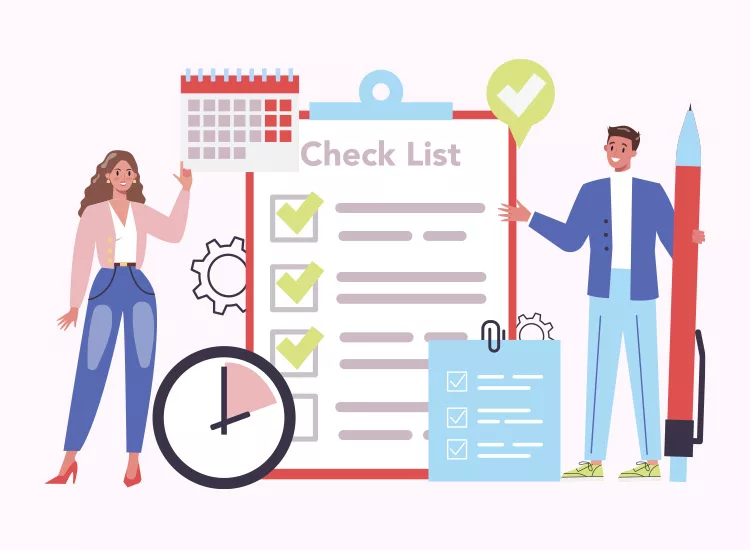
We recommend creating a checklist for your business event that covers everything that needs to happen before, during, and after the event.
It should include stuff like coffee station set up, tech set up, mic and sound checks, lights check, the event schedule, things you need to pack and take with you after the event, etc.
Make your checklist as detailed as possible because it’s easy to forget something seemingly minor and then run into unexpected problems during the event (e.g. you forget to check the mic and then it turns out that it doesn’t work).
Rehearse Your Business Event

It’s important to have at least one proper rehearsal with the tech setup, the speakers and the MC at the event venue. And yes, this applies even if it’s a single-speaker event and that speaker is you.
Having a rehearsal is going to significantly increase the cost of your event but it’s worth the expense because it will help you streamline everything and reduce the number of preventable mishaps during the actual event.
Promote Your Business Event
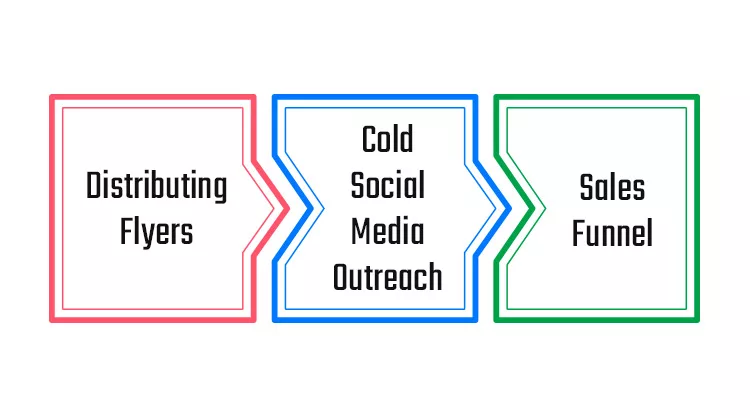
Okay, so now you know how to plan your first business event, but how do you get people to attend it?
Here are a few ideas:
Distributing Flyers
This might seem old school but if it’s a local event, you can print out a bunch of flyers and distribute them locally.
Figure out where your dream attendees hang out and leave flyers there. You can put them on cars, post them on ad boards, leave them at reception desks, etc.
Also, if you want to attract local business owners, you can simply walk into local businesses, ask to speak to the owners, and invite them to your event!
Cold Social Media Outreach
You can also do cold outreach via social media DMs.
LinkedIn is probably the most appropriate platform for that but depending on your target audience Facebook and Instagram can also work well.
Sales Funnel
Finally, you can also build a sales funnel for your event:
- Create a lead magnet – It can be a case study of how someone achieved a specific result that your dream attendees want to achieve using the framework that you are going to teach at your event.
- Create a landing page for your lead magnet where you explain what this case study is about and encourage potential attendees to provide their email addresses so that they can get access to it.
- Create a thank you page that features a video where you explain how potential attendees can download your case study and invite them to your event. End the video with a call to action where you direct them to the event registration page. Make sure to emphasize that your event is FREE.
Once your sales funnel is set up, start driving traffic to it with paid ads. Promote your case study, not your business event. LinkedIn, Facebook, and Instagram ads can all work well here depending on your target audience.
This approach is likely to be more effective than using ads to promote your business event directly. It’s easier to get the attention of potential attendees with a case study that appeals to them.
Plus, it allows you to obtain their email addresses, which means that you can use email to hype up your event with speaker profiles and sneak peeks. Send one email per week leading up to the event to stay top of mind with potential attendees.
After the event, send them a highlight reel with attendee testimonials so that the people who didn’t go could see what they missed. Maybe they’ll attend next time!
Warning: You Need to Account for the Planning Fallacy!
The planning fallacy is a psychological phenomenon where people tend to underestimate how much time and money it’s going to take to complete a project.
If you have never organized a business event before, you are especially susceptible to this fallacy and need to account for that in your event planning.
At first glance, it may seem that organizing a few-hour event is not a big deal, but it’s likely going to be much more difficult than you initially assumed.
Whatever your current estimate of how much time it’s going to take to put your event together, you would probably benefit from doubling it because you will likely encounter all kinds of unexpected delays.
Same goes for the cost of the event. You’ll probably end up going over the budget because of various unexpected expenses.
As you get more experience with event organizing, you’ll learn to create more accurate project estimates.
But for now, it’s best to err on the side of caution and allocate way more resources to your event than you think you’ll need!
Something is Going to Go Wrong So Just Accept it!
No event ever goes according to plan.
It doesn’t matter how well you prepare for it, something is inevitably going to go wrong. That’s just part and parcel of event organizing.
The philosophy of stoicism, particularly its dichotomy of control, can come in handy here: focus on what you can control and accept what you can’t control.
Also, if this is the first time you are organizing a business event, know that you are bound to make a bunch of rookie mistakes that will seem obvious in retrospect. It would be unreasonable to expect anything else when you have never done it before.
So throw the best business event you can but also give yourself some grace once it’s over. It doesn’t matter what went wrong as long as you learn from it. You’ll do better next time!
Want to Learn How to Build Sales Funnels That CONVERT?
Our co-founder Russell Brunson used sales funnels to take ClickFunnels from zero to $100M+ in annual revenue in less than a decade.
He is now widely considered to be one of the top sales funnel experts in the world. Want to learn from him?
His best-selling book “DotCom Secrets” is the best place to start because it covers everything you need to know in order to build sales funnels that convert.
This book is available on Amazon where it has over 2,500 global ratings and a 4.7-star overall rating.
But you can also get it directly from us for free…
All we ask is that you pay for shipping!
So what are you waiting for? 🧐
Get “DotCom Secrets” for FREE!
Thanks for reading Essential Tips For A Successful First Business Event which appeared first on ClickFunnels.
If Click Funnels is of interest and you'd like more information, please do make contact or take a look in more detail here.
Credit: Original article published here.
